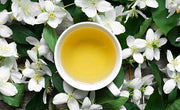Does White Tea Contain Caffeine?

It's well known that caffeine levels in tea can vary. But knowing if white tea contains caffeine is important when considering when to enjoy a cup.
Is the caffeine content in white tea lower compared to other tea varieties? What is the difference between different types of white tea? People often find it surprising that the amount of caffeine in tea depends not only on the type of tea.
In this article, we will look at various factors that affect levels in tea. We'll also compare how much caffeine is in white tea vs other types of tea.
What is White Tea?
White tea is named so because it is harvested before the leaves fully open. The young leaves and buds are covered in fine white hairs at this point.
These hairs act as a shield for the leaf. White tea is popular for its light, delicate flavor and aroma along with many health benefits.

The Assumption About White Tea Caffeine Content
There is a common assumption that white tea leaves are less caffeinated than other types of tea. This misperception may arise from its light color or mis-guided by information they have read elsewhere.
However, the truth is that white tea, like all teas made from the Camellia sinensis plant, are naturally caffeinated. The only decaf teas are tisanes, certain herbal teas, or Rooibos from South Africa's Red Bush plant.
White teas may not always have lower caffeine levels compared to other types of tea.
The amount of caffeine in tea can vary between 5-85 mg. Interestingly, there is only a small variance between white and green teas. On average, a cup of white tea contains approximately 40% less caffeine than coffee.
What Factors Influence the Caffeine Content in Tea?
L-theanine, an amino acid in tea, controls how quickly our body processes and feels the effects of caffeine. There are several factors that determine the levels in tea. Some are controllable, some are not.
What You Can't Control:
Maturity of the Tea Leaves
Young leaves have a higher caffeine content than mature leaves. Thanks to Mother Nature, caffeine acts as a natural insect repellent in young leaves.
Varietals and Cultivars
Various varietals, and cultivars from different regions produce varying levels. Factors such as growing conditions and processing methods can influence these levels.
Age of the Tea
Caffeination in tea reduces with age. It can decrease by as much as a couple percent after just one year. Teas aged for many years can experience a 50% drop in levels.
Please note: these teas are a sold specifically as "aged tea". Simply storing your tea for too many years is not the same thing. This will simply make it "old tea" and reduce the freshness, flavor, and aroma of the tea.
Processing Method
Contrary to popular belief, oxidation does not affect the level of caffeine significantly. Green, oolong, black, and white teas have different levels of oxidation, yet all four contain caffeine. It is the process of halting oxidation that affects the caffeine level of the tea.

What You Can Control:
Selection of the Type of White Tea
Tea made from just the buds of the tea plant has the least caffeine. An example would be Silver Needle tea. White peony tea is similar to silver needles white tea and is made from a bud and two leaves.
Quantity of Leaves per Steep
A higher ratio of leaves to water increases the caffeine content in each cup of tea.
Brewing Process
This is one of the most crucial elements that you have the ability to influence the level of caffeine. There are three key factors to consider when you are determining how to brew white tea:
Using boiling water could potentially compromise the delicate taste of white tea. Allow the hot water to cool a bit before steeping to avoid overpowering the delicate, floral aromas. We recommend steeping it at 175-180° due to its delicate nature.
If you select a tea made strictly from buds, you can increase that time by a minute or two to release the full flavor.
How Long to Steep White Tea
White tea is usually steeped for 4-5 minutes, although the perfect duration varies based on personal preferences. A shorter steeping time yields a lighter, more invigorating taste, while a longer steep brings out richer, more intense flavors.
Unlike green tea, white tea doesn't tend to turn bitter when steeped for extended periods.

How to Reduce Caffeine in White Tea
If you love the delicate, full flavor there are a few techniques to reduce your caffeine intake:
Use whole-leaf/loose-leaf tea. The production of tea bags is less controlled than loose leaf tea. Because the tea bags often contain dust or fannings (broken or crushed leaves) of other teas, so the tea bag could contain more liquid energy than you want.
Choose white tea that comes from Fujian, China, the homeland of white tea. Camellia sinensis assamica is another tea plant native to India. This tea is similar to white tea from China, but the teas are stronger, bolder, and have more caffeine.
Select a decaf white tea. The decaffeination process extracts the majority of caffeine from tea leaves. However, a small amount still remains.
Legally, tea that is marked as decaffeinated is required to contain less than 2.5% of its initial caffeine content. Typically this amounts to less than 2 milligrams per serving. This won't guarantee the tea is 100% decaf if your intake is critical, but it will be lower.
Choose a late-harvest tea. White tea made from the buds or tips of the plant is typically higher in caffeine. Late-harvest teas such as White Peony have leaves that are more mature and have lower content.
Enjoy a white tea blend. White tea is also becoming a popular tea to use in blends such as White Chai or Blueberry White tea. Blending with ingredients such as fruit, rose petals, or spices reduce the caffeine content.
The Caffeine Content of Tea by Type
As mentioned, the process of halting oxidation that affects the caffeine level of the tea. To roughly rank different types of tea based on oxidation level from the highest to the lowest caffeine content in an 8oz cup, it would be as follows:
- Mate: 70-85mg
- Matcha: 60-80mg
- Black tea: 60-75mg
- Oolong tea: 30-45mg
- Green tea: 15-30mg
- White tea: 10-15mg
- Decaf tea: 5-10mg (trace amounts)
- Tisane/Rooibos: 0mg
Note that these are estimates as the content is dependent on the factors as discussed above.
Now that you know the caffeine content of white tea, explore our White Tea Collection for delicious blends to savor!






